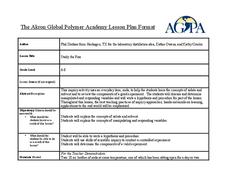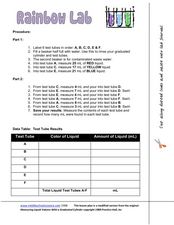Curated OER
Investigating Osmosis
A thorough investigation of cell transport is provided when completing the assignment. The first half requires biology class members to answer questions about diffusion and osmosis with the aid of diagrams. Then they fashion an...
Curated OER
Semipermeable Membranes and Bioaccumulation
Beginning biologists place a drop of food coloring into water of differing temperatures to observe the effect on the diffusion rate. They remove the shells from raw eggs and then experiment with osmosis over the remaining membranes....
Curated OER
Chapter 12 Review, Mixed Review: Solutions
Although there are only six questions on this chemistry handout, it makes a thorough review of solutions. Novices explain why a compound is not an electrolyte, identify types of compounds, and calculate moles, grams, and molalilties in...
Curated OER
Chapter 12 Review, Section 3: Solutions
A neat presentation and challenging content make this solutions learning exercise an ideal homework assignment for your budding chemists. Short answer and problem solving questions get them to review molarity, products, and reactants.
Curated OER
Saltwater: Nifty Aqueous Colorful Layers
A classic investigation on the density of liquids is explained for you in this lesson plan. Te begin, you prepare water samples of different salinities and then add different food coloring to keep them separated and easily identified....
Curated OER
WS 8.1 Solutions
In this solutions learning exercise, students identify solutes and solvents from a list of solutions and they draw water molecules bonding to each other. They fill in the blanks with terms related to bonding in solutions, density of...
Curated OER
Diffusion through Membranes
Pupils identify diffusion and its processes through experimentation and calculations. They also use a CBL and conductivity probe to measure the conductivity of various solutions and study the effect of concentration gradients on the rate...
Curated OER
Mixtures
Students observe that movement of a solute in the solvent increases the rate of dissolution. They demonstrate that when the solute is broken into smaller pieces it dissolves faster.
Curated OER
Mixtures
In this chemistry worksheet, students use the clues given at the bottom of the sheet to complete the crossword puzzle on mixtures. There are 18 clues to solve on the sheet.
Curated OER
Mixtures
Learners experiment with solutions. In this mixtures and solutions science lesson, students work in groups of three to perform an experiment. Learners place a sugar cube in three glasses, and observe and record the different rates...
Curated OER
Study the Fizz
Students experiment to determine which bottle of soda has more dissolved carbon dioxide. In this solutions lesson, students use the scientific method to test the amount of carbon dioxide in bottles of soda. They identify and explain the...
Curated OER
Rainbow Lab
In this mixtures worksheet, middle schoolers experiment with different amounts of solutes and solvents to make solutions. They observe color changes and look for chemical and physical changes in the test tubes. Students answer 5...
Curated OER
Rate of Solubility
Young scholars investigate factors affecting the rate of solubility. In this rate of solubility lesson plan, students experiment by crushing, heating and cooling solutes and solvents to see how the solubility is affected. For each...
Curated OER
Everyone Has Problems, but Chemists Have Solutions
Students observe molar solutions being prepared and gain an understanding of concentration. For this solutions lesson plan, students observe a solution of drink mix being prepared parallel to a solution of salt water. Students gain an...
Curated OER
Solution Shapes
In this solutions worksheet, students soak a pipe cleaner in hot water and a supersaturated solution of 20 Mule Team Borax. Students leave their pipe cleaner in the solution for 30 minutes and then observe. They put it back in over night...
Curated OER
Water the Universal Solvent
In this water and solvent instructional activity, high schoolers answer 20 questions about solutes, solvents, polarity in molecules, and the characteristics of water as a solvent. Students answer 3 questions about the lab they completed...
Curated OER
Solutions
In this solutions learning exercise, students read about the characteristics that define a solution such as the solvent and the solute and the homogeneous mixture. They are given a chart with the differences between solution, colloids...
Curated OER
What is in the Water?
In this mixtures learning exercise, students read about mixture and what determines if a solute dissolves in a solvent. They answer three questions about solutions and determine from a list of compounds which are soluble in water.
Curated OER
Finding Concentration
In this determining concentration worksheet, students are given the equations to find the concentration of a solution in grams per milliliter, to determine the concentration in parts per million, to determine percent mass and percent...
Curated OER
Solubility Curves
In this solubility worksheet, learners use a solubility curve to determine is different solutions are saturated or not. This worksheet has 19 problems to solve and 2 short answer questions.
Curated OER
The Nature of Solutions
In this solutions instructional activity, students compare different types of solutions and distinguish between the solvent and solute in a solution. This instructional activity has 7 matching and 10 short answer questions.
Curated OER
Solutions
In this solutions worksheet, students read about solutions, solutes, and solvents. Students compare solutions with mixtures that are not solutions. Then students complete 10 fill in the blank, 12 matching questions, and 10 terms into a...
Curated OER
The Effect of Temperature on Solubility
In this solubility activity, students conduct an experiment to see how temperature effects the solubility of salt in water. Students record their data in a chart and then graph the results. Then students complete 2 short answer questions.
Curated OER
Hunting for Aqueous Solutions
In this aqueous solutions instructional activity, students will conduct an experiment to determine the solubility of different common kitchen items. Students then complete 3 short answer questions.

























